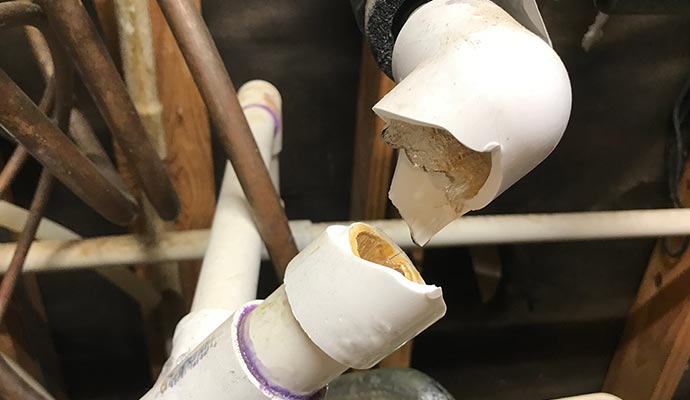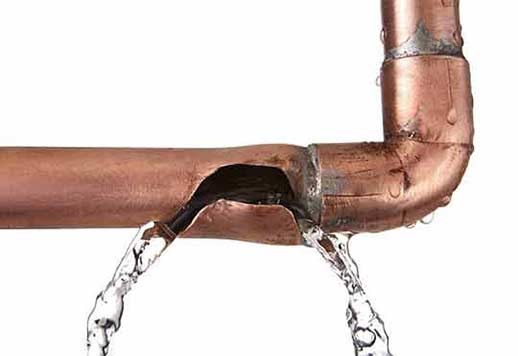What to Do When a Burst Pipe Causes Water Damage in Your Home
What to Do When a Burst Pipe Causes Water Damage in Your Home
Blog Article
Stopping Ruptured Water Lines: Vital Tips to Safeguard Your Plumbing
Protecting against ruptured pipes is a crucial problem for home owners, specifically throughout chillier months when the danger of cold is increased. Implementing strategic procedures such as appropriate insulation, regular inspections, and keeping constant indoor temperature levels can considerably decrease the likelihood of pipeline failure.
Understand Pipe Vulnerabilities
Understanding pipe susceptabilities is vital for effective plumbing maintenance and protecting against expensive damages. Numerous variables add to the sensitivity of pipelines to bursts, consisting of material composition, age, and ecological conditions. Older pipes, particularly those made from galvanized steel or polybutylene, often break down in time, leading to raised risk of leakages and ruptures.
Temperature changes can also considerably impact pipeline honesty. In colder climates, water trapped in pipes can ice up, expanding and putting in stress on the pipe walls, which may eventually lead to a burst. Additionally, high water stress can strain pipelines, specifically at joints and bends, increasing the probability of failing.

Insulate Pipes Effectively
Correct insulation of pipelines is crucial for avoiding cold and subsequent bursts during chilly climate (burst pipe). Shielding your pipes system effectively safeguards versus temperature drops that can result in costly damage. Begin by recognizing susceptible areas where pipes are revealed to outdoor temperatures, such as cellars, attic rooms, and exterior walls
Usage foam pipeline insulation sleeves or wrap insulation tape around these locations to give a safety obstacle. Make sure that all sections of the pipes, specifically those with limited warmth direct exposure, get appropriate insulation. Pay unique interest to installations and joints, as these are a lot more prone to cold.
When shielding, it's essential to select materials that meet neighborhood structure codes and are suitable for the particular atmosphere. For example, fiberglass insulation is usually advised for its thermal resistance properties - burst pipe. In addition, consider utilizing warm cables or tape in severe problems, which can be plugged in to provide supplementary warm
Frequently examine protected pipelines for any indicators of wear or damages, as endangered insulation can reduce its effectiveness. By taking these aggressive steps, you substantially decrease the threat of pipeline bursts, making certain a trusted plumbing system throughout the cold weather.
Maintain Regular Temperature Level
A secure interior temperature level is important for avoiding ruptured pipelines throughout the freezing months. When temperature levels drop, water within pipes can freeze, creating and broadening pressure that might ultimately trigger the pipelines to ruptured. To reduce this danger, homeowners ought to maintain a constant temperature level throughout their home, preferably no less than 55 ° F(13 ° C)Making use of a programmable thermostat can help handle indoor temperatures properly, making certain that rooms with plumbing remain warm also when the home is empty. Pay unique interest to areas that are extra susceptible to cold, such as garages, attic rooms, and cellars. Keeping cupboard doors open under sinks can also enable warmer air from the home to distribute around plumbing.
This minor flow of water can avoid cold by minimizing stress within the pipelines. By implementing these approaches, property owners can dramatically reduce the risk of pipe ruptureds and safeguard their plumbing systems against the harsh wintertime elements.
On A Regular Basis Evaluate Pipes
Normal inspections of pipes systems are vital for protecting against burst pipelines and maintaining general Look At This home stability. Regular checks enable home owners to identify potential issues before they escalate into expensive repair services or major water damage. During these evaluations, it is important to analyze visible pipelines for signs of corrosion, leaks, or put on. Pay unique focus to locations vulnerable to cold, such as cellars, attics, and exterior walls.
In addition, checking links and joints is essential, as these factors are often at risk to leaks. Homeowners need to additionally analyze water pressure degrees, as extreme pressure can stress the pipes system and enhance the risk of pipeline bursts.
Think about scheduling expert pipes inspections at least as soon as a year, especially prior to winter months, to ensure your system is prepared for colder temperature levels. By being proactive in your technique, you can guard your home versus the pricey and disruptive consequences of burst pipes.
Know Emergency Situation Procedures
Recognizing emergency situation treatments is essential for every home owner, especially after conducting regular plumbing evaluations. Being prepared for a plumbing emergency situation can substantially reduce damage and save prices.
Next, maintain vital devices convenient. A pipes emergency kit must consist of a wrench, plunger, and towels, in addition to a flashlight and a container for small leaks. In addition, think about having the call details for a trusted plumbing professional easily available, needs to the circumstance escalate past your control.
If you find a leak or ruptured pipe, instantly switch off the water and inform your plumbing. Furthermore, record the damages with pictures for insurance purposes. burst pipe. Understand the signs of possible plumbing problems, such as uncommon water pressure variations or damp areas on wall surfaces
Ultimately, aggressive understanding and speedy action are critical in handling pipes emergency situations, guaranteeing your home remains secured and decreasing potential damages.

Conclusion
Finally, avoiding ruptured pipelines necessitates a multifaceted strategy that consists of understanding pipeline susceptabilities, proper insulation, keeping consistent interior temperature levels, regular assessments, and expertise of emergency situation procedures. By executing these vital approaches, the danger of pipes failures can be significantly lowered, thus ensuring the longevity and efficiency of the plumbing system. Aggressive measures not just safeguard against possible damages however see here now likewise contribute to general water preservation and the defense of residential property.
In colder environments, water entraped in pipes can ice up, broadening and applying pressure on the pipe wall surfaces, which may eventually lead to a ruptured. When temperature levels drop, water within pipes can ice up, broadening and developing stress that might ultimately trigger the pipelines to ruptured. By carrying out these methods, property owners can significantly reduce the risk of pipeline bursts and protect their plumbing systems versus the harsh winter season elements.

Report this page